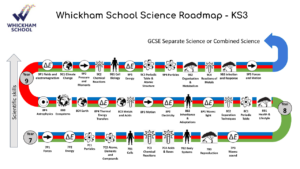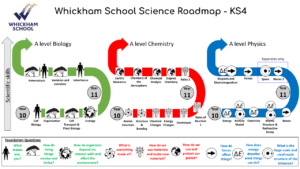Our Science curriculum
The Whickham Science curriculum draws inspiration from Matthew Arnold’s often quoted 1869 essay ‘Culture & Anarchy’ in which he suggested that people should be introduced “…to the best that has been thought and said”. Another point of stimulus for our science curriculum comes from an excerpt of a 1675 letter from Sir Isaac Newton to Robert Hooke, “If I have seen further, it is by standing on the shoulders of Giants”. Hence, we have designed an ambitious and wide-ranging curriculum encompassing the greatest, most foundational scientific knowledge and scientific skills, enabling our pupils to understand their place in the Universe and be prepared for related future study and careers. We have summarised the intent of our curriculum as follows.
The intention of the Whickham Science Faculty is to support our pupils to develop the scientific knowledge and skills to…
- be curious about how our world and the wider Universe works.
- aspire to further qualifications or a career in a scientific field.
- respect scientists and the scientific method.
- have the resilience to seek understanding, question information and opinion.
- have empathy towards the needs of current and future generations, plus other species, to thrive on our planet.
Overview
Secondary school science is traditionally organised into the three disciplines of biology, chemistry and physics. Our high-quality science curriculum prioritises pupils building knowledge of key concepts in a meaningful way that reflects how knowledge is organised within and across the scientific disciplines.
A great deal of time, thought and team work has gone into optimising the sequencing of our curriculum to ensure that pupils are able understand scientific ideas as successfully as possible, developing a well-organised neural network of interconnected substantive and disciplinary knowledge. Another aim of our sequencing is to support long-term memory through introducing new ideas at appropriate times and also employing a spiral to allow our curriculum to revisit, build and deepen understanding.
Moreover, a key aim of our curriculum is to aid our pupils to recognise their learning journey here at Whickham Science, able to see the links between topics and years; the reason for this aim is to further support successful learning of new material as well as the long-term memory of pupils. Our device to aid pupils to recognise the links between topics is that we have developed our Whickham “Foundation Questions” of biology, chemistry and physics; learning is linked to these questions to help clarify connections and the course of learning development. Our Whickham “Foundation Questions” of biology, chemistry and physics are shown in the table below.
| Biology | Chemistry | Physics |
|---|---|---|
| What makes you, you? | What is everything made of? | How do forces affect things? |
| How do living things survive and thrive? | How do we use materials and make new materials? | How does energy describe what things can do? |
| How do organisms depend on, interact with and affect the environment? | How do we use and protect our planet? | What is the large-scale and small-scale structure of the Universe? |
The disciplinary knowledge for scientific skills is first introduced in our first working scientifically topic in year 7. These scientific skills are then interwoven throughout the rest of our curriculum to allow each to be revisited and developed further.
We have categorized the scientific skills as follows:
- Planning experiments.
- Drawing conclusions.
- Evaluating experiments.
- Graphs and calculations.
- Scientific writing
Year 7
In year 7 pupils have science lessons in their tutor groups. Pupils study a variety of topics covering biology, chemistry and physics. The sequence of topics is as follows.
- Working scientifically
- 7P1: Forces (Physics)
- 7P2: Energy (Physics)
- 7C1: Particles (Chemistry and Physics)
- 7C2: Atoms, Elements, Compounds and Mixtures (Chemistry)
- 7B1: Cells (Biology)
- 7C3: Chemical Reactions (Chemistry)
- 7C4: Acids and Alkalis (Chemistry)
- 7B2: Body Systems (Biology)
- 7B3: Reproduction (Biology)
- 7P3: Sound (Physics)
Year 8
In year 8 pupils have science lessons in their tutor groups. Learning builds upon the foundational themes from year 7 and pupils continue to study a variety of topics covering biology, chemistry and physics with scientific skills interwoven. The sequence of topics is as follows.
- 8B1: Health and Lifestyle (Biology)
- 8C1: Periodic Table (Chemistry)
- 8C2: Separation Techniques (Chemistry)
- 8P1: Light (Physics)
- 8B2: Inheritance and adaptations (Biology)
- 8P2: Electricity (Physics)
- 8P3: Motion (Physics)
- 8C3: Metals and Acids (Chemistry)
- 8P4: Thermal Energy Transfers (Physics)
- 8C4: The Earth (Chemistry)
- : Ecosystems (Biology)
- 8P5: Astronomy and astrophysics (Physics)
Year 9
In year 9 pupils have science lessons in their tutor groups. Our year 9 course is a bridge between key stage 3 and key stage 4. In year 9 we introduce the more challenging concepts of key stage 3, whilst revisiting and building knowledge up to GCSE level, for some of the units already studied in year 7 and 8. This supports our spiral curriculum and provides the foundations for success at key stage 4. Pupils continue to study a variety of topics covering biology, chemistry and physics. The sequence of topics is as follows.
- 9P1: Fields and electromagnetism (Physics)
- 9C1: Climate change (Chemistry)
- 9P2: Pressure and moments (Physics)
- 9C2: Chemical reactions (Chemistry)
- A: Cell Biology – structure and movement (Biology)
- B: Energy (Physics)
- C: The periodic table and atomic structure (Chemistry)
- D: Particles (Physics)
- E: Organisation and bioenergetics (Biology)
- F: Reactions of metals (Chemistry)
- G: Infection and Response (Biology)
- H: Forces and Motion (Physics)
Year 10
In year 10 pupils follow one of two pathways:
- AQA Separate Sciences, where pupils work towards three separate GCSEs: GCSE Biology, GCSE Chemistry and GCSE Physics.
- AQA Trilogy Combined Sciences, where pupils work towards two GCSEs covering biology, chemistry and physics, combined. Both courses are taught by 3 teachers who specialise in each of the disciplines of Biology, Chemistry and Physics.
The topics covered in the various courses are listed below. The rationale for the sequencing of topics is common across the courses: we aim to revisit and build on the foundations of years 7-9, introduce new topics in an appropriate order and at an appropriate time to ensure that new learning is successful and supports the long-term memory of pupils. Furthermore, considerations about the structure of GCSE papers have also been taken into account.
Each course follows the same sequence of topics, pupils studying the separate sciences course will study more content within each topic. All pupils will have completed the content required for paper 1 of their course by the end of year 10.
Biology
- B1&B3: Cell Biology – Division and Immunity
- B2: Digestion
- B4: Bioenergetics
- B7: Ecology
Chemistry
- C1: Atomic Structure and the Periodic Table Review
- C2: Structure, Bonding and the Properties of Matter
- C3&4: Chemical Changes
- C5: Energy Changes
- C4: Electrolysis
- C6: The Rate and Extent of Chemical Reactions
Physics
- P1: Energy
- P3: Particle Model of Matter
- P2: Electricity
- P4: Atomic Structure & Radiation
- P6: Waves
Year 11
In year 11 pupils follow one of two pathways:
- AQA Separate Sciences, where pupils work towards three separate GCSEs, GCSE Biology, GCSE Chemistry and GCSE Physics.
- AQA Synergy Combined Sciences, where pupils work towards two GCSEs covering biology, chemistry and physics, combined. The AQA Synergy course is organised in two halves, one covering Life and Environmental Sciences and the other covering Physical Sciences.
The topics covered in the various courses are listed below. The rationale for the sequencing of topics is common across the courses: we aim to revisit and build on the foundations of years 7-9, introduce new topics in an appropriate order and at an appropriate time to ensure that new learning is successful and supports the long-term memory of pupils. Furthermore, considerations about the structure of GCSE papers have also been taken into account.
At the end of year 11 pupils sit their external GCSE exams.
- GCSE Biology: Two exam papers both of 1 hour, 45 minutes.
- GCSE Chemistry: Two exam papers both of 1 hour, 45 minutes.
- GCSE Physics: Two exam papers both of 1 hour, 45 minutes.
- GCSE Combined Sciences: Four exam papers in total. Two exam papers both of 1 hour, 45 minutes covering Life and Environmental Sciences and two exam papers both of 1 hour, 45 minutes, covering Physical Sciences.
The topics studied for each course are as follows:
Biology (Separate Sciences)
- Homeostasis
- Inheritance, Variation & Evolution
- Ecology
Chemistry (Separate Sciences)
- C6: Rate and Extent of Chemical Reactions
- C7: Organic Chemistry
- C8: Chemical Analysis
- C9: Chemistry of the Atmosphere
- C10: Using Resources
Physics (Separate Sciences)
- P6: Waves
- P5: Forces
- P7: Magnetism and Electromagnetism
- P8: Space Physics
Life and Environmental Sciences (Combined Sciences)
- Ecology and Biodiversity
- States of Matter
- Earth’s Atmosphere and Water
- Inheritance
- Evolution and Variation
Physical Sciences (Combined Sciences)
- Rate and Extent of Chemical Reactions
- Forces and Elastic Energy Changes
- Chemical Quantities
- Motion
- Electrolysis
Year 12 & Year 13
At Key stage 5 we offer four courses: A Level Biology (AQA), A Level Chemistry (OCR A), A Level Physics (OCR A) and BTEC Level 3 Applied Science (Pearson).
All these courses build upon the knowledge and skills developed at GCSE level, so a secure level at GCSE is an essential starting point for success at KS5.
The sequencing of topics have been developed using similar principles to those discussed for KS4.
For more information about each course, please see the Whickham sixth form prospectus and courses guide on the school website.



